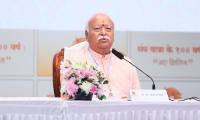Between 1967 and 1973 the Bombay Natural History Society in Mumbai- a non-governmental organization- carried out a "bird ringing" project. It was funded by the United States under a programme called "Migratory Animal Pathological Survey" of the US Army.
The project required the BNHS staff collect blood samples from migratory birds arriving in India and send the blood slides to the MAPS south Asian headquarters in Bangkok for analysis.
Threat of agro-terrorism is real
Elliott McClure, who was heading MAPS, had described the project as, "A bird migration study aimed at trying to discover if there are any links between migratory birds and human disease."
The Gandhi government stopped the BNHS project in 1975 on the advice of parliament public accounts committee. The PAC (reports 167 & 200) had concluded that the data collected by the US - about diseases that can enter India through birds - had military significance and could be misused in BW against India.
The potential of migratory birds in BW arises from the fact they leave their homes at a particular time and follow the same path to predictable destinations. They can carry viruses either in their blood or on the mites and ticks usually present on the birds' feathers and other places.
Govt to stock 1 million doses of bird flu drug
The BNHS, according to the PAC reports, had sent blood samples of 4,800 migratory birds visiting India to the US army medical institute. By the time the US government itself closed down MAPS in 1975, the project had examined a total of 50,000 blood slides from 1,147 species of birds from India and nine other East Asian countries and had mapped their movements.
Asad Rahmani, the current director of BNHS, told PTI that he has asked the ministry of environment and forests for money to revive the bird migration study because of bird flu threat.
"The fear of misuse in BW is very real even today but we have to move ahead," he told PTI in a telephone interview.
"If it is flu this year it may be another virus next year," he said. "We are proposing to start bird migration study this winter because of the bird flu threat and are hoping to continue on a long term basis. We must ring a large number of birds and the project would need huge funding."
Rahmani said that under the Indo-Russian migratory bird treaty the BNHS is also discussing with Russians on the possibility of reviving the cooperative study terminated in 1973.
"The fear of bird flu is giving the impetus to governments of different countries to collaborate with us," Rahmani said.
He said the bird survey must be started afresh as data collected under the Indo-American project may not be very relevant today.
"There have been a lot of changes in ecology that might have changed the flight pattern of birds." He is hopeful of the project will get funding from one of the UN agencies.








